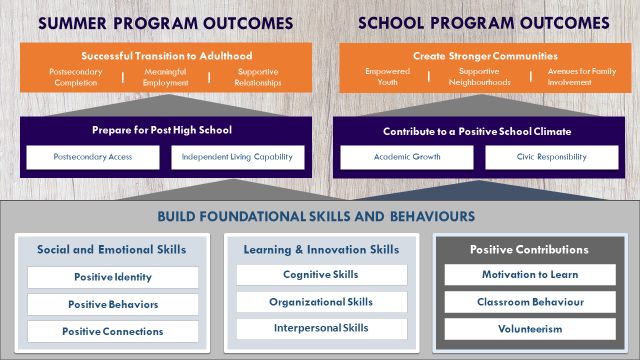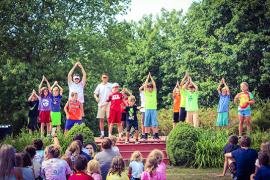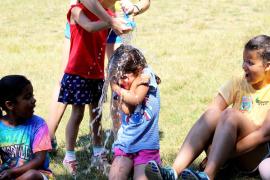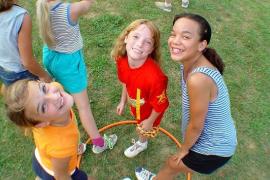Helping Kids Change Their Stories — A Taste of Camp Measurement North of the Border is a short blog series that explores Tim Hortons Foundation Camps’ summer and school programs and their approach to impact measurement and camp research. The series outlines Tim Hortons Foundation Camps’ research journey from a practitioner perspective, while highlighting challenges and early learnings in their research process. This is post 2. See post 1.
When we committed to changing our program, we knew where we wanted to be. We knew we were committed to providing an evidence-based program that fostered strengths within youth. We were grounded by the belief that thriving youth create strong communities. And we were motivated to create and deliver programs that empowered youth from disadvantaged circumstances to pursue a life without limits. But, with any organizational change, our ambitious goals presented more questions: How do we get there? Where do we begin? And — most importantly — what do we want youth to have learned upon completion of our programs?
As we looked in the mirror and reflected on being the constant variable , we started to question everything. We dissected (and continue to dissect) every aspect of our program. Why do we eat meals the way we do? Why do we use camp names? Why the 12–16 year old age group? Why wilderness experiences? Why canoeing? Why archery? Why initiative challenges? Why? As we began to understand our why, we were able to identify our goals, our reasons, and, eventually, our outcomes.
To establish our outcomes, we began to shift our thinking from the activity we are performing to asking what we are trying to achieve through the activity. We looked at our program schedules and defined what we wanted our campers to leave each activity having learned. Let’s take archery for example. We challenged ourselves to clearly articulate the goals of the archery program. Sure, we wanted our campers to try something new and shoot for the bullseye. But we knew there was more. We knew we could facilitate the program in a way that enabled campers to build self-confidence, increase impulse control, and set goals. We determined that archery — or any program activity — is simply the tool to help our youth meet the outcome. It’s the catalyst, and the camp experience becomes the vehicle for learning.
Created in partnership with Mission Measurement, leader in social sector data and insights, our outcomes framework guides our programmatic decisions. As we work with individual youth in the Summer Program, our ultimate goal is for youth to transition successfully to adulthood. As we work with schools and classrooms in our School Program, we aim to create stronger communities. These are massive, ambitious goals, and we acknowledge a successful transition to adulthood or a strong community is influenced and shaped by many factors – not just a Tim Hortons Foundation Camp experience. But we do know where our program has the greatest impact and how we can connect experience in our program to outcome achievement. In building foundational skills and behaviors and targeting social, emotional, learning, and innovation skills, we translate our camp activities into tangible youth development outcomes.

Now, don’t get me wrong here — we still have a lot of work to do! As we shift our mindset from programs and activities to outcomes and impact, we are pushing the envelope. The delivery of our programs work on an activity schedule rotation; and our program staff tend to look at what activity they are leading campers through, not immediately at how they are supporting youth to build social and emotional skills or learning and innovation skills. Furthermore, we continually strive to find the balance between program consistency and unique delivery across our seven camp locations. On the continuum of programs to impact, we currently sit somewhere between activities and outcomes. We’re getting there. The design of our framework and our emphasis on outcomes enables our staff to begin to connect the dots when they’re delivering the content. As our staff connect the pieces, our campers experience greater impact. This, we know, will take time.
Katie Wheatley, director of program innovation with Tim Hortons Foundation Camps, specializes in data-driven curriculum design for youth who thrive in alternative learning environments. With a background in special education, Katie combines her passion for education and experience in camping to lead the innovation, measurement and development of Tim Hortons Foundation Camps programs in Canada and the US. For more information about Tim Hortons Foundation Camps, please visit timhortons.com/foundation.
Photo courtesy of Girl Scouts River Valleys
Thanks to our research partner, Redwoods.
Additional thanks goes to our research supporter, Chaco.
The views and opinions expressed by contributors are their own and do not necessarily reflect the views of the American Camp Association or ACA employees.




